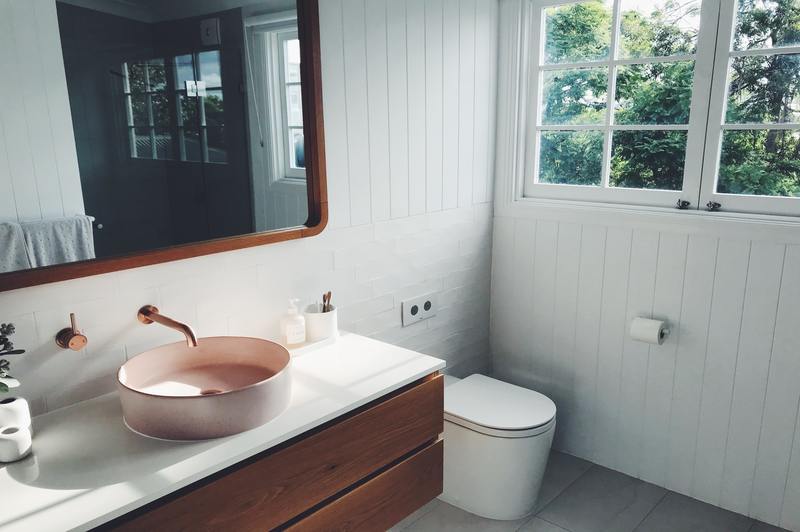Have you suddenly stopped and asked yourself, “why does my bathroom smell like mildew?”
Mold and mildew are to blame for the musty odor in your bathroom. These fungal developments in damp cellars cause a similar musty odor.

They flourish in damp, poorly-ventilated spaces, such as restrooms, where there is a lot of moisture. Your bathroom’s musty scent might sometimes be an early indicator that something is wrong.
Mold and mildew tend to be dark in color and grow out of thin, feathery strands.
Why Does My Bathroom Smell So Musty?
There is a tendency for mildew or mold in its early stages to be found in damp, moisture-prone regions. Water temperature in the bathroom might lead to a continually humid atmosphere.
Clearing the air and keeping things dry might be difficult. However, if you detect a musty odor, it’s most likely caused by the fungus that produces mold.
Here’s a guide on how to get rid of red mold in the shower.
What’s The Challenging Part About Mold?
Mold can be subtle, so be on the lookout for it. Hidden behind walls and inside cupboards, this fungus is spreading.
It can conceal beneath towels, wall hangings, or mirrors in the creases of your shower curtain.
You and your family’s safety could be in jeopardy by breathing in the stench, but it’s also dangerous. Symptoms of mold exposure include allergies, a runny nose, painful sinus, and exhaustion.
Also, mold isn’t the only concern. Mold spores can become airborne if they are disturbed.
As a result of this, your mold-related health problems may get worse and spread to other parts of your property.
What Can I Do If My Bathroom Smells Like Mildew?
1. Clean it all up
The first step in combating the mildew odor is to clean everything thoroughly. It includes washing those thick towels hanging in the bathroom for years and the musty bathroom carpets and closed window drapes.
When doing laundry, experts recommend adding one cup of white vinegar to the load before washing it. In addition, clean your non-slip mats regularly.
Replace your vinyl shower curtain with a washable cloth, linen, or polyester shower curtain to complete the transformation.
The presence of water might be a significant contributor to that foul odor. A mildew smell might develop if there is a gradual drain leak underneath a sink or surrounding the drain.
The solution is to patch the leak as soon as possible and wipe the area you soaked down with a robust, bleach-based cleaning. Bathtubs can also develop a mildew odor from time to time if you do not correctly seal them and if minor quantities of water get between the walls and the bathtub.
3. Allow the bathroom to take a breath
Rooms that are dark, wet, and warm provide an ideal environment for mildew to develop. To counteract this, improve air quality and allow fresh air.
In the absence of a window in the bathroom, keep the bathroom door open. Add a ceiling fan or try to run an exhaust fan to keep the air circulating if you require more privacy and like to bathe with the door shut.
4. Add an air purifier
Mildew not only smells bad, but it can also make persons with breathing problems unwell by irritating their eyes, nose, throat, and lungs.
A high-performance air purifier in the bathroom will eliminate the harmful mold and bacteria from the air while also eliminating the odor. In addition, a high-flow air purifier will improve air circulation in the bathroom, which will aid in the prevention of mold formation.
Why Does Mildew Grow In The Bathroom?
Moist draws mildew, dark environments that include a plentiful nutrition source, such as water. Bathrooms are great places for mold to colonize because of the persistent dampness from hot showers, the frequent darkness within the bathroom, and the elevated amounts of indoor humidity in the area.
What Are The Long-Term Consequences Of Mold Exposure?
While smelling musty scents in the bathroom is unpleasant, breathing in the tiny microbes in the airborne mold spores leads to adverse health implications. Mold exposure can result in headaches, discomfort, difficulty breathing, and respiratory illnesses.
Mold can exacerbate asthma symptoms in people who already suffer from the condition.
What Steps Can I Take To Avoid Mildew Odors?
The ability to provide good ventilation in the bathroom is incredibly beneficial in keeping the space dry. Mold spores will be unable to survive in environments that do not have sufficient moisture.
Setting the bathroom fan to run in the background while taking a shower and leaving it running for 30 minutes afterward can assist in lowering humidity levels and water content in the bathroom. Alternatively, you may open a window.
For additional help, here’s how to clean toilet tank mold.
Conclusion
Now you know the answer to your question of “why does my bathroom smell like mildew”. As a piece of advice, if your bathroom has a musty odor, you should take all of the required steps to ensure that it stays dry in the future.
